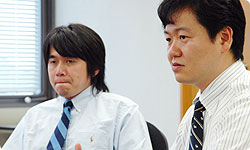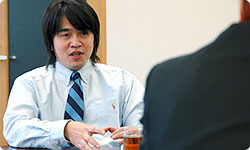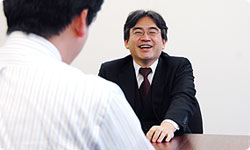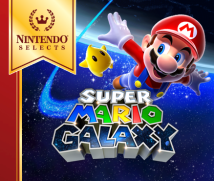2. Listening to Many Voices
Last year at the release of Wii, a lot of people were asking for a new 3D Mario release. When the GameCube was released, there definitely were people saying that if Super Mario Sunshine4 was released at launch, things may have been different. I think Mario games are fated to have that much riding on them. This time, Super Mario Galaxy will be released all of 11 months after the launch of Wii; please tell me, what did you struggle with? 4 Super Mario Sunshine is a Mario 3D action game for the GameCube that was released in Europe in October 2002.

We unveiled Super Mario Galaxy for the first time last year at the E3 event5 held in the US, where Miyamoto-san announced that it would be released within 6 months after Wii's launch. At the time, I thought that we’d hopefully make it somehow. 5 E3 is a game show held annually in Los Angeles. Super Mario Galaxy was first announced here in May, 2006.
But, that turned out not to be the case.
Correct. I truly apologise to our customers who have been waiting for this game to come out for so long. But with this being the first 3D action Mario game in a while, we had very strong feelings about this game, and we felt that we couldn’t have our fans play it until we had managed to deal with any elements that we were not fully satisfied with. So although it was important to try and release this simultaneously with Wii's launch, we also felt that it was much more important to make a game that the customers would feel was really worth buying. We were so determined that we even thought of closing down the Tokyo office if Super Mario Galaxy received poor reviews.

And so you invited members of the public to take part in an impressive number of play tests. Why did you decide to have so many?
The idea to keep running it through such play tests came from our experience making Jungle Beat. This game was on the show floor during the Nintendo World6 that was held in 2004, where we carefully observed the visitors playing it and used what we learned then to make some final adjustments to the game. It was a valuable experience for me as a developer to learn the kinds of things you have to pay attention to in certain situations, so for Super Mario Galaxy, I wanted to make the best use possible of this kind of input. 6 Nintendo World was a hands-on event held by Nintendo in November 2004 in five locations throughout Japan.
Do you think 3D action games require more of this kind of play testing than other game types?
Actually, there was a time when I thought it might be impossible to make any 3D action game so accessible that anybody could easily pick it up and enjoy the experience. Many people end up losing track of where they are when playing in a 3D field, and there are also a lot of people who get motion sickness if the camera moves automatically. So, during the development of Super Mario Sunshine, we prepared several different camera modes that the players can choose from. However, this burdened the players with an additional task; they had to decide on the camera angle before they could go into game play.

Do you regret the decision?
I do. So for our next game, Jungle Beat, we followed up with a side-scrolling action game where we made the camera automatic, so that the player could play the game without worrying about the camera angle at all. But I think that by doing that, we just ignored the underlying problem with camera angles in 3D action games and did not do anything to solve the problem.
Then in Jungle Beat, you were able to make some surface changes, but that didn't deal with the root problem. Super Mario 647, which Koizumi-san also worked on, was a game which received very favourable reviews but at the same time created a group of players that felt that it was hard for them to play 3D games. So the problem that was created then was left to be dealt with later? 7 Super Mario 64 was the first 3D Mario action game, which was released simultaneously with the Nintendo 64 console in March 1997 in Europe.

It was like we were ignoring the real problem. So for Super Mario Galaxy, I wanted to take on this difficult problem that was present within 3D action games upfront. This is part of why I felt it was necessary to listen to as many of the public play testers' opinions as possible.
So we had quite a few members of the public play test Super Mario Galaxy, and in a sense, I feel like I was one of those play testers myself. Of course, we also had Miyamoto-san sample it quite a bit. But there is one major difference between Miyamoto-san and myself, and that is the fact that I'm the type that gets motion sickness from 3D games.
A game producer who gets motion sickness! (laughs)

Every time a sample was ready to go, I would take it to Shimizu-san so that he could try it out. When he said "This is no good, I'm getting dizzy", I’d say "OK, I'll fix it right away" and get on it.
So he was just like a human motion sickness sensor! (laughs)
Yes, so I stuck to my role as the sensor. So for example, if Miyamoto-san came along and said "You need to make the camera angles more extravagant or it’ll lose impact", I replied with something like "But if we do that, I’ll get motion sickness". However, the problem is that he rarely listens to what I say. Of course, when the public testers say "I get motion sickness here", then he'll say, "OK, let's fix it"! (laughs)
Miyamoto-san must think the customers' opinions are of the utmost importance, even more than those of his fellow employees.
However, since everybody's different, our solution is ultimately just a camera that makes it harder to get motion sickness. We can't say that people will never get motion sickness from it.
I see. But still, for this game you had members of the public play a game that was still in development, and did your best to follow up on their reactions and implement that into the game.
